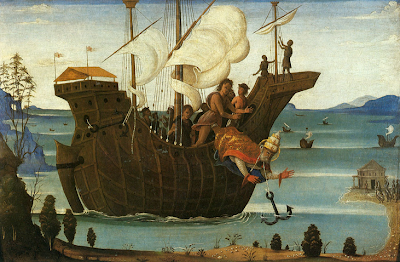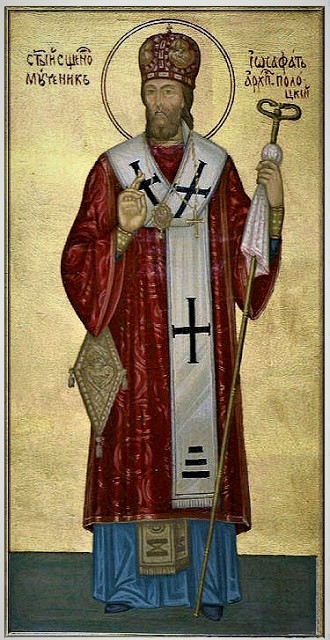Jesus said to his disciples, “In those days, after that great tribulation, the sun will be darkened, and the moon will not give its light, and the stars will be falling from heaven, and the powers in the heavens will be shaken. And then they will see the Son of man coming in clouds with great power and glory."
- St. Mark 13:24-26
St. Mark reports to us words of Christ when He speaks about His return on the last day. It’s a reminder to us that the season of Advent is but a few weeks away, when we are bidden by the Church to prepare for the coming of Christ. There are two aspects to our preparation; first, that of preparing for the celebration of the Nativity of Jesus Christ, and second, reminding us that we need to be spiritually prepared for the day when Christ will return in glory.
The message of this Gospel reading has an urgency about it, felt by Christians from the earliest days of the Church. There is, running throughout our faith, what is known as the “messianic hope” which is expressed in this Gospel. It is the expectation we profess every time we say the Creed, that the exalted Lord Jesus will return in glory. Throughout the New Testament there is the eager note sounded again and again about “waiting for the coming our Lord Jesus Christ.”
Some of the very earliest Christians made the mistake of trying to pin down the time of Christ’s return, as there have been those throughout history who have made the same mistake, forgetting that our Lord taught us that “no man knows the day or the hour” of His return. But we do believe that Christ will return to us; we believe “that he shall come again in glory to judge both the quick and the dead.”
We live in the “last days,” and those last days began with the birth, death and resurrection of our Lord Jesus Christ. At the time of His ascension into heaven, the promise was given to the apostles that “this Jesus, whom you have seen taken from your sight, will return in the same way as you have seen Him go.” The second coming of Christ is a doctrine of our faith.
Our Lord Jesus Christ said, “In those days, after that great tribulation, the sun will be darkened, and the moon will not give its light, and the stars will be falling from heaven, and the powers in heaven will be shaken. And then they will see the Son of man coming in clouds with great power and glory. And then he will send out the angels, and gather his elect from the four winds, from the ends of the earth to the ends of heaven...” And so when considering the second coming of our Lord Jesus Christ, there are four main features which call for our attention:
First, He will come in truth and with an unmistakable reality. Christ tells us, “They will see the Son of Man coming...” In other words, there won’t be any doubt about who He is. Up until the moment of His return, deception is possible. There were many false prophets in the Old Testament; we’re warned about false Christs in the New Testament. In fact, people were so accustomed to false Messiahs and false prophets, that even on the day of the Resurrection, two of the disciples said sadly on the way to Emmaus, “But we had hoped that he was the one to redeem Israel...” thinking that Jesus was just one more in a long line of men who gave false hope. The rising up of false leaders giving false hopes is part of the common history of mankind. Certainly, we can understand that for those who don’t believe that Christ has come, they might be prepared to accept a self-styled Christ with the right credentials; but for those who believe that Christ has already come, it’s harder to understand how they could be fooled; however, Jesus warned of this very possibility, when He said, “For false Christs and false prophets will arise and show great signs and wonders, so as to lead astray, if possible, even the elect.” These false prophets will work on the fears and prejudices and doubts of the faithful, and there will be any number of movements and false apparitions and empty promises to fool even those who belong to Christ. We’ve seen these things come and go, even in our own lifetime, with people chasing after some charismatic speaker, or some supposed apparition, even some smooth-talking world leader. But at His true second coming, Christ will stand before the whole world, unmistakable as the one and only Saviour and Lord.
Secondly, Christ will be manifested universally. He tells us that He will be seen “from the far ends of the earth to the far ends of the heavens.” That’s what will happen. But for now, it is our responsibility to carry the message of Christ throughout the world. Dark corners need the Light of Christ so that we can help bring about the day when “the earth shall be full of the knowledge of the Lord.” But the coming of Christ, when it happens for the second time, will not be so gradual, and it won’t depend upon our efforts. Rather, it will be like the flash of lighting which races across the dark sky. Lightning seems to follow no law. It penetrates everywhere with a frightening beauty, and there’s a split-second silence before the roar of the thunder is heard. Here’s a way to distinguish false Christs from true: the whole world will, all at once, know that He has come, just as the bolt of lightning illumines the whole sky.
Thirdly, Christ will come with “great power and glory.” This will be manifested first in the changes that will come over the material heavens. The sun will be darkened, the moon will no longer shine with the sun’s reflected light; the stars will appear to fall from heaven, and the powers of heaven will shake, in preparation for their demise. And then, there will be the appearance of the Son of man. What will be His sign? Perhaps a fiery Cross, remembering the sign of our salvation; or maybe a new sign, corresponding to the new heavens and the new earth. We don’t know. But there will be some signal so that everyone will know of this glory which will surround Christ in His second coming. We can scarcely imagine such a thing, and we cannot really put it into words before it happens.
And finally, when Christ comes again, He will search out those who belong to Him. “He will send out the angels, and gather his elect from the four winds...” Scripture records the words which tell us that the first time Christ came, He came “to seek and to save that which was lost.” When He did that it was more modest, and more quietly done. Nicodemus came to him “by night.” Joseph of Arimathea was a disciple, “but secretly, for fear of the Jews.” Many of the rulers “believed in Him, but did not confess Him.” But how different it will be when He returns! All His elect will be gathered, openly and conspicuously, in the face of the billions of people in the world. Then those who have been cleansed of their sins through His blood, will be openly gathered around Him, to be with Him forever.
This is the Scriptural teaching which the Church confesses about the Second coming of Jesus Christ. It reminds us, once again, that God is the God of history. He acts in history, and just as He began history, so He will end history by coming in glory at the end times. We catch a glimpse of this at every Mass, when Christ comes to us under the forms of bread and wine which have been changed into His Body and Blood. For that moment, history stands still, as God makes our Altar His throne, just like the earth will be His throne on the Last Day.
Advent will soon begin, that time when we consider the coming of Christ - not just His coming as a baby in Bethlehem, but also His triumphant coming in the final days as well. It reminds us that we must, at all times, be ready. Our hope must be in God; it must not be misplaced in man – and that’s important to remember, especially if we are discouraged about recent events in the life of our own nation.
We must wait for the return of Jesus the Lord, not for some new discovery which will supposedly transform our lives. We must place our faith in the blood of Christ, and not in the technology of men. The world would want us to make a trade-off, but it would be a bad one. It would want us to give up heaven for earth, to give up God for gadgets, to give up the coming of Christ for the coming of some man-made paradise. But that we cannot do, if we take the truth of our faith seriously.
The Son of man will come with great power and glory. When Jesus speaks of the passing away of heaven and earth He says that it is known only by the Father – that even He, Jesus, by His own consent chooses to remain ignorant of the exact time… and He wants us to get the message: we’re not supposed to work out dates and timetables as to the end of things. It is enough for us to know that the time will come. Day by day we need to simply do our duty to God and to others, and live in such a way that it does not matter when Christ returns, because we will be ready for it – whenever it happens.
______________________________
Pictured: The medieval Doom Painting in the Church of St. Thomas Becket, Salisbury, is the largest and best preserved in the United Kingdom. Painted c.1470, it was covered with lime whitewash at the time of the protestant reformation and not seen again until 1819. It was restored in 2019, bringing it back to its vibrant, detailed glory.




.jpg)
























.jpg)
_-_James_Tissot.jpg)
